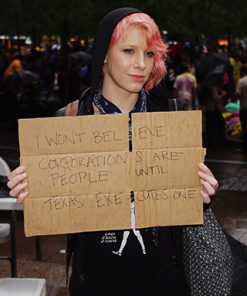The consolidation of media into the hands of a few corporate conglomerates has transformed news and entertainment into a tool for profit, propaganda, and control.
Once upon a time, the press was known as the Fourth Estate—a crucial counterbalance to political power, a watchdog ensuring that corruption and abuse were exposed to public scrutiny. Today, it has been reduced to a commodity, packaged and sold by a handful of powerful conglomerates that decide what stories are told, how they are framed, and—most dangerously—what is never reported at all.
The numbers tell the story. In the United States, just five corporations—Comcast, Disney, Warner Bros. Discovery, Paramount Global, and Fox—control the vast majority of television, film, and news media. This isn’t just a problem of ownership; it’s a problem of influence. When the same handful of executives sit atop multiple news outlets, entertainment studios, and digital platforms, the range of viewpoints narrows, and the public is fed a carefully curated narrative designed to maximize profit and maintain power structures.
The consequences are severe. News outlets that should be holding governments and corporations accountable instead serve as their mouthpieces, filtering stories to avoid upsetting advertisers, investors, and political allies. Journalists who challenge these interests are pushed to the margins, replaced by pundits who deliver pre-approved talking points masquerading as independent analysis. Investigative reporting—once the backbone of journalism—is increasingly sidelined in favor of clickbait headlines, partisan outrage, and celebrity gossip, because sensationalism sells, and selling is the primary function of corporate media.
Even politicians dare not challenge the status quo. In 2004, Vermont governor Howard Dean was a leading contender to be the Democratic nominee for the U.S. presidency. But, after Dean expressed interest in breaking up the media behemoths on Hardball with Chris Matthews, an unflattering speech of his was replayed constantly, dubbed I Had a Scream Dean was escorted to the political margins by the media. Many people still associate Dean with this speech.
The psychological effects of this media consolidation are profound. People believe they are informed when, in reality, they are consuming carefully crafted narratives designed to reinforce existing power structures. Media monopolies create a landscape where dissenting voices are drowned out, debate is artificially constrained, and the illusion of choice replaces genuine diversity of thought. As Noam Chomsky famously argued in Manufacturing Consent, media corporations do not need to engage in outright censorship; they simply shape the boundaries of acceptable discourse, ensuring that only perspectives favorable to elites dominate the conversation.
This is not a uniquely American problem. Across the globe, media ownership is concentrated in fewer and fewer hands. In Australia, Rupert Murdoch’s News Corp controls over half of the country’s newspaper circulation. In the UK, three companies dominate 90% of national newspaper sales. In many countries, state-run media outlets serve as direct propaganda arms for those in power, eliminating any pretense of journalistic independence.
Meanwhile, independent journalism struggles to survive. Local newspapers, once the backbone of accountability in communities, have been gutted by corporate takeovers and hedge fund vultures looking to extract every last ounce of profit before discarding what remains. In the past two decades, more than a quarter of U.S. newspapers have shut down, leaving behind “news deserts” where residents receive little to no local reporting. What replaces them? Corporate-run outlets that syndicate national stories with little relevance to local issues, or worse—social media, where misinformation spreads unchecked, filling the vacuum left by a decimated press.
But the problem extends beyond news. The entertainment industry, too, has been captured by conglomerates that homogenize culture, churning out content designed not to challenge but to pacify. When a small group of corporations owns the majority of film studios, television networks, and streaming platforms, the result is creative stagnation—a relentless parade of reboots, sequels, and lowest-common-denominator storytelling designed to maximize marketability. What gets lost is art, risk-taking, and the ability of media to serve as a vehicle for social critique. The hoarding of wealth amidst poverty is tailored so as to be perceived as a status symbol, rather than a moral failing. We are fed a steady diet of wealth worship that dresses up grotesque inequality as aspirational entertainment. Reality shows glorify the ultra-rich as “self-made” geniuses, while movies and streaming series drape their obscene excess in soft lighting and sweeping orchestral scores, making private jets, palatial estates, and billion-dollar deals feel like the natural order of things. The message is clear: wealth isn’t hoarded—it’s earned, and if you’re not draped in designer clothes sipping champagne on a rooftop, well, that’s just your personal failing. Never mind that extreme wealth is almost always built on exploitation, that billionaire fortunes accumulate while wages stagnate, and that entire industries thrive on suppressing workers’ rights to keep their profit margins fat. Instead of questioning this parasitic economic model, we’re encouraged to idolize the few who hoard everything, as if their fortunes were the inevitable outcome of merit, rather than a rigged game where the house always wins.
There is a solution: break them up. Antitrust laws, long dormant in the face of corporate lobbying, must be revived and strengthened to dismantle media empires that have grown too powerful. No single corporation should control multiple news networks, newspapers, or digital platforms. Cross-ownership between entertainment media and news organizations should be prohibited to prevent conflicts of interest that turn journalism into another arm of the entertainment industry.
Public funding for independent journalism must be expanded, ensuring that investigative reporting and local news do not rely solely on the whims of advertisers or billionaire benefactors. Countries like Norway and Sweden have implemented successful models where public funds support media diversity without government interference, creating a press landscape that is both independent and sustainable.
Ownership structures must also be democratized. Worker-owned media cooperatives, independent news organizations, and nonprofit journalism models must be supported through policy and public investment. When journalists and communities, rather than shareholders, control media institutions, the priorities shift from profit to truth.
Dismantling media conglomerates is not about silencing voices; it is about ensuring that more voices are heard. A society where information is controlled by a few is not a democracy—it is an oligarchy with better branding. Free press cannot exist under corporate rule, and the future of democratic societies depends on breaking the stranglehold of media monopolies before they become permanent.
Therefore, under Folklaw:
Media conglomerates shall be dismantled through aggressive antitrust enforcement, prohibiting any single corporation from owning multiple major news outlets, television networks, or entertainment studios.
Cross-ownership between news media, entertainment, and telecommunications companies shall be banned to prevent conflicts of interest. No entity shall have the power to control the flow of information for profit or political advantage.
Public funding with independent oversight shall be allocated to independent, nonprofit, and community-run journalism, enabling investigative reporting and local news to remain resilient against market pressures and corporate influence.






Discussions
There are no discussions yet.